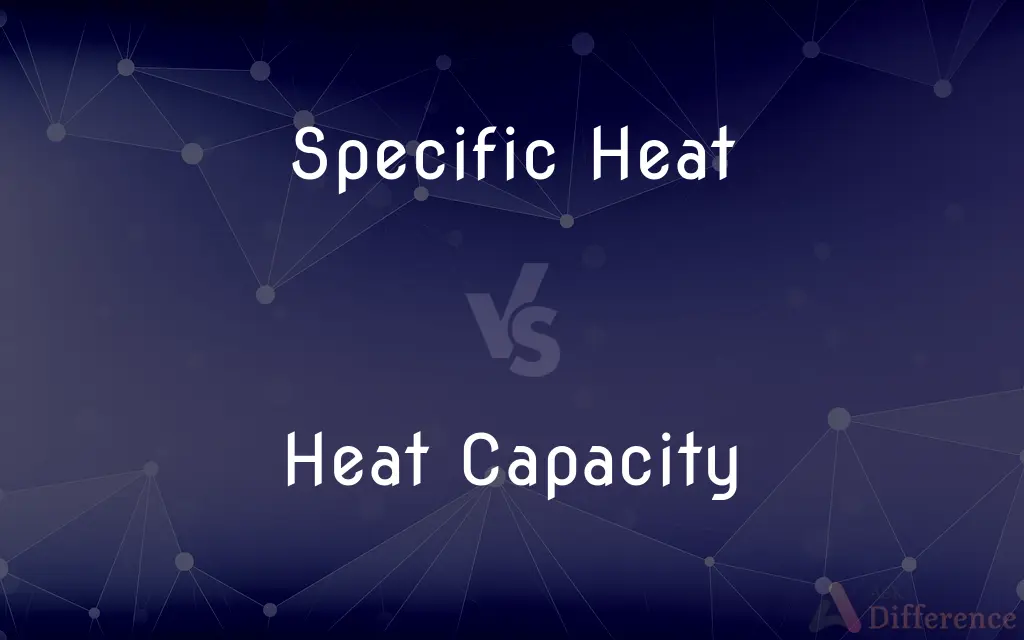Specific Heat vs. Heat Capacity — What's the Difference?
By Tayyaba Rehman — Published on January 7, 2024
Specific heat is the heat required to raise the temperature of a unit mass of a substance by one degree, while heat capacity is the total amount of heat needed to raise the temperature of an entire object by the same amount.

Difference Between Specific Heat and Heat Capacity
Table of Contents
ADVERTISEMENT
Key Differences
Specific heat and heat capacity are closely related concepts in thermodynamics, but they are not the same. Specific heat refers to the amount of heat required to raise the temperature of one unit mass (e.g., one gram or one kilogram) of a substance by one degree Celsius. Heat capacity, on the other hand, is a broader term that refers to the total amount of heat needed to raise the temperature of an entire object or system by one degree Celsius.
In every discussion of specific heat, it's crucial to remember that it's an intrinsic property of a material, meaning it doesn't change regardless of the amount of the material you have. Conversely, heat capacity is an extensive property; it depends on the quantity of the material. For instance, the specific heat of water is a constant value, but the heat capacity of a swimming pool is much greater than that of a glass of water due to the larger amount of water present.
Specific heat provides valuable insights into the thermal properties of materials. For example, water has a high specific heat, meaning it can absorb a lot of heat before its temperature rises significantly. Heat capacity, on the other hand, helps in understanding the thermal behavior of entire systems or objects. For instance, even though a lake and a cup of water might have the same specific heat, the lake's heat capacity is vastly larger, so it takes much more energy to raise its temperature.
Specific heat is usually expressed in units like joules per gram-degree Celsius (J/g°C) or calories per gram-degree Celsius (cal/g°C), highlighting its focus on a unit mass. Heat capacity, however, is often given in joules per degree Celsius (J/°C) or calories per degree Celsius (cal/°C), signifying the total heat required for the entire object or system. This distinction in units reflects the fundamental difference in how specific heat and heat capacity are conceptualized and applied in various scientific and engineering contexts.
Understanding the specific heat of materials is essential in many applications, from designing thermal systems to understanding climate dynamics. Heat capacity plays a crucial role in heating and cooling processes, thermal design, and even in everyday cooking, where understanding how much heat is required to achieve a desired temperature change in a pot or pan is essential.
ADVERTISEMENT
Comparison Chart
Definition
Heat required to raise 1 unit mass by 1°C
Total heat required to raise entire object's temp by 1°C
Units
J/g°C or cal/g°C
J/°C or cal/°C
Dependency
Intrinsic property, independent of mass
Extensive property, dependent on mass
Focus
Concentrates on unit mass of substance
Focuses on the entire object or system
Application Examples
Understanding material properties
Calculating energy for heating/cooling systems
Compare with Definitions
Specific Heat
Heat needed to raise temperature of 1g of a substance by 1°C.
Water's high specific heat makes it effective for cooling systems.
Heat Capacity
Extensive property depending on an object's mass.
The heat capacity of a furnace is crucial for its efficiency.
Specific Heat
Measure of a material's capacity to absorb heat.
Sand’s low specific heat explains why beaches get hot quickly.
Heat Capacity
Amount of heat absorbed for temperature change in a system.
High heat capacity materials are used in thermal energy storage.
Specific Heat
Ratio of the amount of heat absorbed to increase temperature.
Specific heat is crucial in designing thermal insulation materials.
Heat Capacity
Total thermal energy change capacity of an object.
Heat capacity is vital in calculating heating requirements for buildings.
Specific Heat
Quantity of heat per unit mass per degree temperature change.
Metals typically have lower specific heats compared to water.
Heat Capacity
Total heat required to raise an object's temperature by 1°C.
A large pool has a high heat capacity, slowing its temperature change.
Specific Heat
Intrinsic thermal property of a substance.
Specific heat determines how quickly a material heats up.
Heat Capacity
Measure of an object's ability to store thermal energy.
The Earth’s oceans have a vast heat capacity, affecting climate.
Common Curiosities
What is specific heat?
Specific heat is the heat required to raise the temperature of 1 gram of a substance by 1°C.
Are specific heat and heat capacity dependent on mass?
Specific heat is independent of mass, while heat capacity depends on mass.
How do you calculate heat capacity?
Heat capacity can be calculated by multiplying specific heat by the mass of the object.
Can two substances have the same specific heat?
Yes, two different substances can have the same specific heat.
Does shape affect an object's heat capacity?
No, shape does not affect heat capacity, but mass and material do.
Can specific heat be negative?
No, specific heat is always a positive value.
What is heat capacity?
Heat capacity is the total heat required to raise an object's temperature by 1°C.
Is specific heat constant for a substance?
Generally, specific heat is considered constant over a limited temperature range.
Does heat capacity vary with temperature?
Yes, heat capacity can vary with temperature for some substances.
Why is water's specific heat important?
Water's high specific heat helps regulate Earth's climate and temperature.
Does heat capacity affect cooking?
Yes, the heat capacity of pots and pans affects cooking times and temperatures.
Is specific heat relevant in material selection?
Yes, specific heat is crucial in selecting materials for thermal applications.
How do specific heat and heat capacity relate?
Heat capacity is a product of specific heat and the mass of the object.
Can specific heat be used in energy storage?
Yes, materials with high specific heat can be used in thermal energy storage.
Why is understanding heat capacity important in engineering?
Understanding heat capacity is essential for designing efficient heating and cooling systems.
Share Your Discovery

Previous Comparison
EIGRP vs. OSPF
Next Comparison
Internal Combustion Engine vs. External Combustion EngineAuthor Spotlight
Written by
Tayyaba RehmanTayyaba Rehman is a distinguished writer, currently serving as a primary contributor to askdifference.com. As a researcher in semantics and etymology, Tayyaba's passion for the complexity of languages and their distinctions has found a perfect home on the platform. Tayyaba delves into the intricacies of language, distinguishing between commonly confused words and phrases, thereby providing clarity for readers worldwide.












































